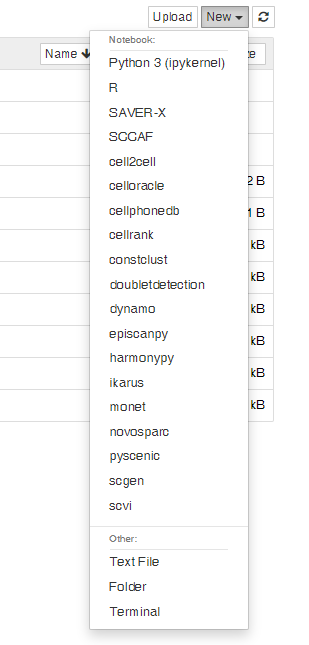A docker image for single-cell analysis. It's on docker-hub and GitHub. This repository is an update of singlecell_jupyter.
See Changelog
(The tools that cannot be installed due to unresolved errors are crossed out.)
-
Pipeline: Seurat (and Seurat wrappers), scater, scran,
scranPY,Scanpy, scvi-tools (previous scVI), Pagoda2, kallisto-bustools, rapids_singlecell -
Quality check: DropletQC
-
Doublet finding: Scrublet, DoubletFinder
-
Batch correction and data integration: Harmony, scmap, scBio, SingleCellNet
-
Clustering: SC3, metacell, SCCAF, Constclust, bigSCale2, scTriangulate, miloR
-
Cell-type annotation: RCA, garnett, scCatch, SingleR, CellTypist, ikarus
-
Trajectory (pseudo-time) analysis: Monocle3, slingshot, Palantir, FROWMAP
-
RNA velocity: velocyto, scVelo, CellRank, Dynamo, MultiVelo, UniTVelo
-
Trajectory alignment: cellAlign, Genes2Genes
-
Cell-cycle prediction: tricycle
-
Gene network: WGCNA, SCENIC (pySCENIC), CellOracle, EEISP
-
Cell-cell interaction: CellPhoneDB, SingleCellSignalR, scTensor, cell2cell, CellChat, Scriabin
-
Multi-modal analysis: LIGER, scAI, MOFA2, scMoMaT, Mowgli, MARIO, SATURN, Moscot, SCOT
-
Bulk deconvolution: SCDC, MuSiC, BayesPrism, InstaPrism, AutoGeneS
-
Gene perturbation prediction: GEARS
-
Others: Sleepwalk, singleCellHaystack, SignatuR, ComplexHeatmap
-
scATAC-seq: Cicero, chromVAR, ArchR, Signac, cisTopic, EpiScanpy, SCENT
-
Database (genome): BSgenome.Hsapiens.UCSC.hg19, BSgenome.Hsapiens.UCSC.hg38, BSgenome.Mmusculus.UCSC.mm10, BSgenome.Scerevisiae.UCSC.sacCer3, BSgenome.Dmelanogaster.UCSC.dm6
-
Database (gene): EnsDb.Hsapiens.v75, EnsDb.Hsapiens.v79, EnsDb.Hsapiens.v86, EnsDb.Mmusculus.v79
-
Database (motif): JASPAR2016, JASPAR2018, JASPAR2020,
JASPAR2022 -
SeuratData: ifnb_3.1.0, panc8_3.0.2, pbmcsca_3.0.0, pbmc3k_3.1.4, celegans.embryo_0.1.0, cbmc_3.1.4, hcabm40k_3.0.0, thp1.eccite_3.1.5, stxBrain_0.1.1, stxKidney_0.1.0, bmcite_0.3.0, pbmcMultiome_0.1.2, ssHippo_3.1.4
Since ShortCake version 3, we have created several flavors to reduce the image size and make it easier to use, as shown below.
- shortcake_seurat: Contains only Seurat and its related packages.
- shortcake_r: Contains additional R packages installed on top of
shortcake_seurat. Jupyter notebook is available, but Python tools are not installed. - shortcake_light: Installs the shortcake_default environment on top of
shortcake_r. This flavor includes Seurat, Scanpy, Monocle3, and scVelo, and is sufficient for most users. - shortcake: Installs almost all Python virtual environments on top of
shortcake_light. The only exceptions are the scVI and rapids_singlecell environments. - rnakato/shortcake_scvi: Installs the scVI environment on top of
shortcake_light. - rnakato/shortcake_rapidsc: Installs the shortcake_rapidsc environment on top of
shortcake_light. - shortcake_full: The full image with all tools installed.
For example, you can use shortcake_light version 3.0.0 with this command:
docker run --rm -it rnakato/shortcake_light:3.0.0 jupyternotebook.sh
For Docker:
You can pull (download) the ShortCake docker image with this command:
docker pull rnakato/shortcake:<version>
Note: The size of the ShortCake docker image is large (about 100GB). It requires a large amount of space on the docker cache directory.
Then you can run ShortCake with the command:
# Container login
docker run [--gpus all] --rm -it rnakato/shortcake /bin/bash
# Execute jupyter notebook (see 'mnt/' directory in the notebook )
docker run [--gpus all] --rm -p 8888:8888 -v (your directory):/work/mnt rnakato/shortcake jupyternotebook.sh
The --gpus all option is needed if you use a GPU (e.g., scvi-tools).
You can build the singularity file (.sif) of ShortCake with this command:
singularity build -F shortcake.sif docker://rnakato/shortcake
Instead, you can download the singularity image of ShortCake from our Dropbox (We use singularity version 3.8.5).
Then you can run ShortCake with the command:
# Execute jupyter notebook (Python and R)
singularity exec [--nv] shortcake.sif jupyternotebook.sh
# Execute R directory
singularity exec [--nv] shortcake.sif R
The --nv option is needed if you use a GPU (e.g., scvi-tools).
To avoid version conflicts between tools, we created several Python environments with micromamba.
You can see the list of environments installed in the image with micromamba env list command as follows:
$ docker run -it --rm rnakato/shortcake:3.0.0 micromamba env list (base)
Name Active Path
─────────────────────────────────────────────────────────────────────────
base * /opt/micromamba
cell2cell-screadsim /opt/micromamba/envs/cell2cell-screadsim
celloracle /opt/micromamba/envs/celloracle
cellphonedb /opt/micromamba/envs/cellphonedb
dynamo-moscot /opt/micromamba/envs/dynamo-moscot
episcanpy /opt/micromamba/envs/episcanpy
genes2genes-mowgli /opt/micromamba/envs/genes2genes-mowgli
ikarus-novosparc /opt/micromamba/envs/ikarus-novosparc
mario /opt/micromamba/envs/mario
seacells /opt/micromamba/envs/seacells
shortcake_default /opt/micromamba/envs/shortcake_default
Note that the base environment does not include any tools other than Jupyter notebook and EEISP.
shortcake_default is the default environment with Python3.9 and contains vairous tools as below:
- scanpy
- scvelo
- cellrank
- harmonypy
- kallisto
- anndata2ri
- autogenes
- bbknn
- cellmap
- celltypist
- doubletdetection
- magic-impute
- liana
- pyscenic
- palantir
- constclust
- multivelo
- screcode
- scrublet
- sctriangulate
- snapatac2
- velocyto
The other environments are named after the tools they contain.
We recommend using Jupyter Notebook (JupyterLab) to use ShortCake:
singularity exec shortcake.sif jupyternotebook.sh
Specify the appropriate kernel (environment) to use them.
In addition, the R command and all R tools are usable in the R kernel.
ShortCake also provides the Rstudio environment:
singularity exec shortcake.sif rstudio
Of course, you can also use ShortCake with command line tools. For example:
singularity exec shortcake.sif velocyto run10x -m repeat_msk.gtf <10Xdir> <gtf>
If you want to use a virtual environment from the command line, use the run_env.sh script to activate it:
singularity exec shortcake.sif run_env.sh <environment> <command>
# Example to activate "celloracle" environment
singularity exec shortcake.sif run_env.sh celloracle python -c "import celloracle"
First, clone and move to the repository
git clone https://github.com/rnakato/ShortCake
cd ShortCake
Since the Dockerfile installs many packages from GitHub, first get a GitHub token from your own repository. Next, create Docker_R/.env and Docker_Python/.env files and store the token as follows:
GITHUB_PAT=<your_GitHub_token>
Move Docker_R directory:
cd Docker_R/
Download the SeuratData dataset using wget.sh in the Docker_R/SeuratData directory:
cd SeuratData/
sh wget.sh
Then build packages:
cd Docker_R
# build both shortcake_seurat and shortcake_r
docker-compose -f docker-compose.yml build
# build shortcake_seurat only
docker-compose -f docker-compose.yml build seurat
# build shortcake_r only
docker-compose -f docker-compose.yml build r
Move to 'Python' directory:
cd ../Docker_Python/
Then build Python packages:
# build all the flavors below
docker-compose -f docker-compose.yml build
# build shortcake_light
docker-compose -f docker-compose.yml build light
# build shortcake
docker-compose -f docker-compose.yml build default
# build shortcake_full
docker-compose -f docker-compose.yml build full
# build shortcake_scvi
docker-compose -f docker-compose.yml build scvi
# build shortcake_rapidsc
docker-compose -f docker-compose.yml build rapidsc

